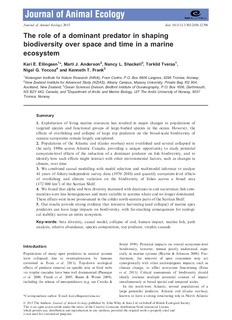The role of a dominant predator in shapingbiodiversity over space and time in a marineecosystem
Ellingsen, Kari Elsa; Anderson, Marti J.; Shackell, Nancy L.; Tveraa, Torkild; Yoccoz, Nigel Gilles; Frank, Kenneth T.
Peer reviewed, Journal article
Permanent lenke
http://hdl.handle.net/11250/2396542Utgivelsesdato
2015Metadata
Vis full innførselSamlinger
- Publikasjoner fra CRIStin - NINA [2364]
- Scientific publications [1392]
Sammendrag
1. Exploitation of living marine resources has resulted in major changes to populations of
targeted species and functional groups of large-bodied species in the ocean. However, the
effects of overfishing and collapse of large top predators on the broad-scale biodiversity of
oceanic ecosystems remain largely unexplored.
2. Populations of the Atlantic cod (Gadus morhua) were overfished and several collapsed in
the early 1990s across Atlantic Canada, providing a unique opportunity to study potential
ecosystem-level effects of the reduction of a dominant predator on fish biodiversity, and to
identify how such effects might interact with other environmental factors, such as changes in
climate, over time.
3. We combined causal modelling with model selection and multimodel inference to analyse
41 years of fishery-independent survey data (1970–2010) and quantify ecosystem-level effects
of overfishing and climate variation on the biodiversity of fishes across a broad area
(172 000 km2) of the Scotian Shelf.
4. We found that alpha and beta diversity increased with decreases in cod occurrence; fish communities
were less homogeneous and more variable in systems where cod no longer dominated.
These effects were most pronounced in the colder north-eastern parts of the Scotian Shelf.
5. Our results provide strong evidence that intensive harvesting (and collapse) of marine apex
predators can have large impacts on biodiversity, with far-reaching consequences for ecological
stability across an entire ecosystem.
Key-words: beta diversity, causal model, collapse of cod, human impact, marine fish, path
analysis, relative abundance, species composition, top predator, trophic cascade

